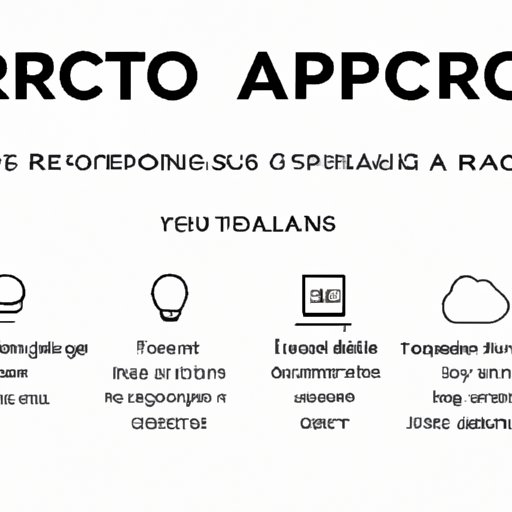Introduction
Airdrop cryptos are digital tokens or coins that are distributed for free, usually by a blockchain-based project or cryptocurrency platform. This method of distribution has become increasingly popular in recent years as a way to increase exposure and create a community around a project. In this article, we’ll explore what airdrop cryptos are, the benefits and risks associated with participating in them, and how to identify and avoid potential scams.
What is an Airdrop Crypto and How Does it Work?
An airdrop crypto is a form of marketing strategy used by blockchain-based projects and cryptocurrency platforms. The goal of an airdrop is to spread awareness about a project and incentivize people to join the platform. Airdrops are typically used to distribute tokens or coins to users for free, either directly or through a referral system.
In order to participate in an airdrop, users must complete a set of tasks or requirements. These tasks may include following the project’s social media accounts, joining their Telegram or Discord channels, or referring other people to join the project. Once the user has completed the required tasks, they will receive the tokens or coins from the airdrop.

Pros and Cons of Participating in Airdrop Cryptos
Before participating in an airdrop, it’s important to understand the potential benefits and risks. On the one hand, airdrops can be a great way to get some free tokens or coins without having to invest any money. They also allow users to familiarize themselves with the project and its goals before investing in it. On the other hand, there are some potential risks associated with participating in airdrops. For example, some airdrops may require users to provide sensitive personal information, which could be used for malicious purposes.
Step-by-Step Guide to Claiming Airdrops
Claiming airdrops is relatively straightforward, though the specific process may vary depending on the project. Here’s a general step-by-step guide to claiming airdrops:
1. Research the project to make sure it is legitimate and that you understand the terms and conditions.
2. Gather the necessary documents. Depending on the project, this may include your email address, name, phone number, and/or wallet address.
3. Complete the required tasks. This may include following the project’s social media accounts, joining their Telegram or Discord channels, or referring other people to join the project.
4. Submit the necessary documents and wait for confirmation. Some projects may require additional verification steps.
5. Once your participation is confirmed, you will receive the tokens or coins from the airdrop.
Comparing Airdrops and ICOs: What’s the Difference?
It’s important to note that airdrops are not the same as initial coin offerings (ICOs). An ICO is when a project sells tokens or coins in exchange for cryptocurrency or fiat currency. Airdrops, on the other hand, are free distributions of tokens or coins. Therefore, participating in an airdrop does not require any investment, whereas participating in an ICO does.
Reviewing Popular Airdrop Cryptocurrencies
There are a number of popular airdrop cryptos available today. Here’s a look at some of the most popular airdrop cryptos and what they offer:
• Bitcoin Cash (BCH): Bitcoin Cash is a hard fork of Bitcoin that was created in 2017. It offers faster and cheaper transactions than Bitcoin, as well as increased privacy and security. BCH airdrops are typically offered in exchange for completing simple tasks such as following the project’s social media accounts.
• Ethereum (ETH): Ethereum is an open-source, public blockchain-based platform that enables developers to build and deploy decentralized applications. ETH airdrops are usually offered in exchange for completing tasks such as joining the project’s Telegram channel or referring other users to join the project.
• Litecoin (LTC): Litecoin is a cryptocurrency that was created in 2011 as a fork of Bitcoin. It offers faster transaction times and lower fees than Bitcoin. LTC airdrops are typically offered in exchange for completing tasks such as following the project’s social media accounts or referring other users to join the project.
Examining Potential Scams and How to Avoid Them
Unfortunately, there are a number of scammers who have taken advantage of the popularity of airdrops. It’s important to do your research before participating in any airdrop to make sure it is legitimate. Here are some tips to help you avoid potential scams:
• Look for signs of legitimacy. Legitimate airdrops should have a website, social media presence, and a white paper outlining the project’s goals.
• Be wary of requests for personal information. Legitimate airdrops should not require any sensitive personal information such as your Social Security number.
• Don’t click on unknown links. If you receive an unexpected link in an email or message, don’t click on it. It could be a scammer trying to steal your personal information.
Conclusion
Airdrop cryptos are a great way for users to get some free tokens or coins without having to invest any money. They can also be a great way to familiarize yourself with a project before investing. However, it’s important to be aware of the potential risks associated with participating in airdrops, such as the possibility of scams. By doing your research and following the steps outlined in this article, you can safely participate in airdrops and take advantage of the potential rewards.
(Note: Is this article not meeting your expectations? Do you have knowledge or insights to share? Unlock new opportunities and expand your reach by joining our authors team. Click Registration to join us and share your expertise with our readers.)
